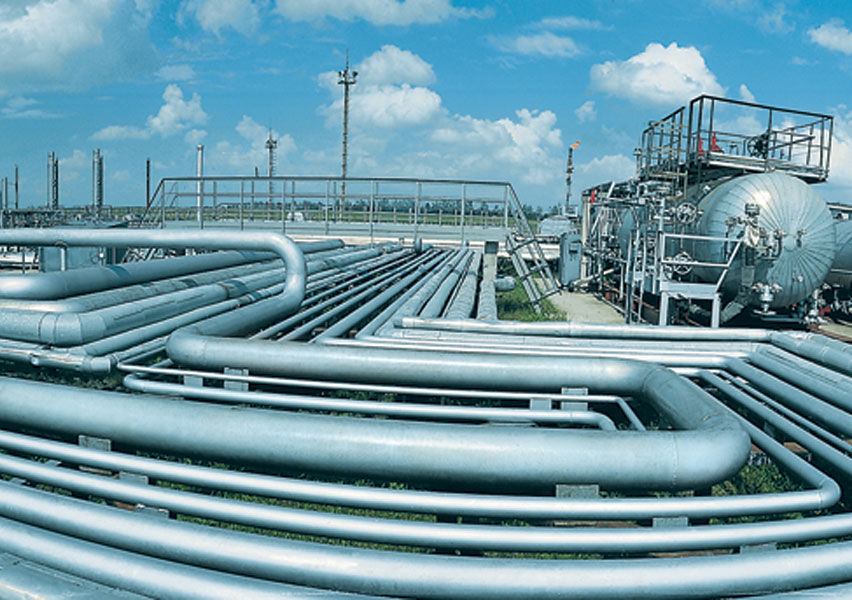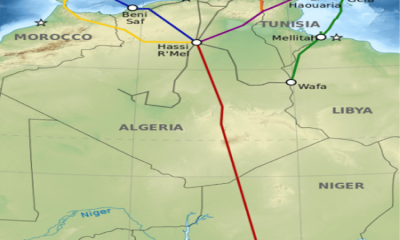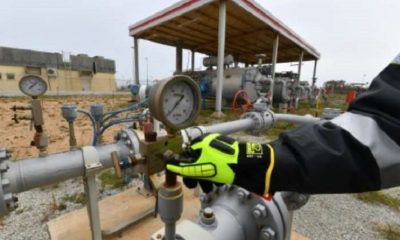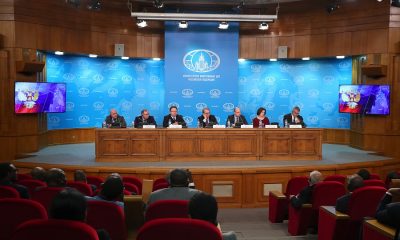World
Amid Russia-Ukraine Crisis, Trans-Saharan Gas Pipeline Offers Hope for Europe

By Kestér Kenn Klomegâh
Europe is still looking for reliable alternative sources of energy especially gas, as its energy relations fell nosedive with Russia. It has been exploring energy sources from the Asian region down to Africa. But while African energy sources exist, it largely lacks the infrastructure to transport it up to Europe. And transporting gas would have to go across borders which requires some kind of regulations and clearance agreements between the African countries.
The Trans-Saharan gas pipeline (also known as the NIGAL pipeline and Trans-African gas pipeline) was first proposed back in the 1970s. The inter-governmental agreement on the pipeline was signed by the Energy Ministers of Nigeria, Niger and Algeria on 3 July 2009 in Abuja. It has not materialized, among many factors, due to lack of finance and multiple complicated government bureaucracy. But Europe’s demand is pushing for fixing some solutions and resolving obstacles to realize this project.
Nigerian authorities said that Russia’s Gazprom has negotiated with Nigeria about its possible participation in the project. Experts described this interest as a business strategic step to gatekeep and control the flow of gas from Africa into Europe. Russia would be interested in tactically delaying the project. Its aim is to be the leading supplier, and any other competitors must be placed under tight monitoring and control.
Charles Robertson, Global Chief Economist at Renaissance Capital, questioned in an email discussion how Russia can heavily invest in Africa’s energy sector, especially in the exploration and production of oil and gas to be exported to Europe.
“Russia or Kazakh oil competes with Libyan, Angolan or Nigerian oil. Russia or Kazakh gas competes with Algerian or Egyptian gas. Russia can supply food – but that’s mainly needed by north Africa,” he wrote, and concluded: “By forging strong cooperation, the European Union (EU) has more of the industrial machinery that Africa might need to industrialize, although Chinese machinery may be more appropriate for the technical level of industry in Africa.”
Russian companies have exited mega-projects in Zimbabwe, and also went out from Botswana, Cameroon and Sierra Leone. Russians were not chosen after the project bidding process in Mozambique. There are, therefore, other reliable potential foreign corporate investors such as Indian company GAIL, France’s Total S.A., Italy’s Eni SpA and Royal Dutch Shell have expressed interest in participating in the project.
Differences exist though. According to the Algerian Energy Minister Chakib Khelil – “only partners that can bring something to the project, not just money, should be there. On the other side, Energy Ministers of Algeria and Nigeria have said that “if things go well, there will be no need to bring international oil companies into the project” and “if the need for partnership in the project arises, not every partner will be welcome on board on the project.”
Mahamane Sani Mahamadou, Minister of Petroleum for the Republic of Niger; Mohamed Arkab, Minister of Energy and Mines, Algeria, and Chief Timipre Sylva, Minister of State for Petroleum Resources of Nigeria as well as the Director Generals of National Oil Companies (NOCs) of the three African countries held thorough discussions on the implementation of the multi-billion Trans-Saharan Gas Pipeline (TSGP) in June 2022, in Abuja, capital of the Federal Republic of Nigeria.
According to reports, a Steering Committee made up of the three Ministers and Director Generals of the NOCs, established during the two-day meeting, will be responsible for updating the feasibility study for TSGP and will meet at the end of July 2022 in Algiers to discuss how to progress with the TSGP project.
The Ministry of Petroleum of Niger commends all parties for this significant step, viewing both the establishment of the taskforce and roadmap as key drivers towards making the TSGP a reality. With energy poverty increasing across the African continent due to limited investments in energy projects, delays in exploration, production and infrastructure rollout, the Covid-19 pandemic and global energy transition-related policies, the TSGP project will bring in a new era of energy reliability for Africa.
With the 4,128 km pipeline running from Warri in Nigeria to Hassi R’Mel in Algeria via Niger, the pipeline will not only create a direct connection between Nigeria and Algeria’s gas fields to European markets but will bring significant benefits to Niger.
With over 34 billion cubic meters of gas, Niger, in its own rights, also has the potential to become a gas exporter, and with Europe expanding energy ties with Africa, the TSGP project will mark a new era of improved regional cooperation in Africa, enhancing gas monetization and exports while scaling up Niger-exports to Europe via Algeria.
Meanwhile, with the pipeline making headway, opportunities for the country to increase domestic gas utilization on the back of new reserves from Niger and Nigeria have arisen. With Niger seeking to improve electricity access and ensure energy affordability through increased exploitation of gas, the TSGP initiative will be a game-changer.
The pipeline will enable up to 30 billion cubic meters of natural gas to be traded yearly enhancing regional and international energy trade, enabling Niger to expand the role of natural gas in its energy mix and address energy poverty.
The efforts of Afreximbank for the creation of an African Energy Bank is a huge testimony of how Africa can enhance cooperation and leverage domestic solutions to optimize its oil and gas market, notes Sebastian Wagner, Executive Chair of the Germany Africa Business Forum. “What we want to see is African financiers rallying towards supporting the rollout of TSGP. Increased oil and gas exploration, production and assets development is what will bring Africa out of energy poverty by 2030,” Wagner acknowledged in comments.
With gas emerging as the energy of the future, the $13 billion TSGP projects could lead to socioeconomic growth by unlocking massive investments across the energy sector. It will simultaneously help create jobs in various industries including energy, petrochemicals and manufacturing whilst optimizing energy production and positioning Africa as a global energy hub.
The pipeline will start in the Warri region in Nigeria and run north through Niger to Hassi R’Mel in Algeria. In Hassi R’Mel the pipeline will connect to the existing Trans-Mediterranean, Maghreb–Europe, Medgaz and Galsi pipelines.
These supply Europe from the gas transmission hubs at El Kala and Beni Saf on Algeria’s Mediterranean coast. The length of the pipeline would be 4,128 kilometres (2,565 mi): 1,037 kilometres (644 miles) in Nigeria, 841 kilometres (523 miles) in Niger, and 2,310 kilometres (1,440 miles) in Algeria.
Reports say the pipeline is to be built and operated in partnership between the NNPC and Sonatrach. The company would include the Republic of Niger. Initially, NNPC and Sonatrach would hold a total of 90% of the shares, while Niger would hold 10%.
The annual capacity of the pipeline, previously estimated at US$10 billion, would be up to 30 billion cubic meters of natural gas. The pipeline was originally expected to be operational by 2015. In the year 2019, the project is still in the prospecting phase. Now, it is unknown what next as there are also safety concerns about the project itself and the future practical operations.
Nigeria, Niger and Algeria are among the least secured areas in the region because of various active terrorist movements that destabilize all technical processes and construction of gas pipelines across Africa. However, the Trans-Saharan gas pipeline is still seen as an opportunity to diversify the gas supplies to the European Union.
World
Iranian Supreme Leader Ali Khamenei Dies After Air Strikes

By Dipo Olowookere
Iranian Supreme Leader, Mr Ayatollah Ali Khamenei, has died after coordinated airstrikes carried out by the United States and Israel on Tehran on Saturday morning.
His death was confirmed on Sunday morning by Iranian state media, which also disclosed that his daughter and grandchild were among those killed in the bombardment, which destroyed his compound.
Mr Khamenei was killed during a meeting with top leaders of the Middle East country yesterday, including the Defence Minister Amir Nasirzadeh and Revolutionary Guard commander Mohammad Pakpour, who reportedly died too.
His elimination has sparked mixed reactions, with some Iranians on the streets celebrating his demise, and others condemning the joint air strikes.
The President of the United States, Mr Donald Trump, described the late Iranian leader as “one of the most evil people in history,” expressing satisfaction at the action, which he said was “successful,” as it represented justice for both Iranians and Americans.
Meanwhile, Tehran has vowed to further respond to the attacks after initially firing missiles at six neighbours, including Qatar, Saudi Arabia, Kuwait, UAE, Bahrain, and Jordan.
Flight operations in the region have been disrupted because of the retaliatory action of Iran over the weekend, though most of the missiles were intercepted.
World
AfBD, AU Renew Call for Visa-Free Travel to Boost African Economic Growth

By Adedapo Adesanya
The African Development Bank (AfDB) and the African Union have renewed their push for visa-free travel to accelerate Africa’s economic transformation.
The call was reinforced at a High-Level Symposium on Advancing a Visa-Free Africa for Economic Prosperity, where African policymakers, business leaders, and development institutions examined the need for visa-free travel across the continent.
The consensus described the free movement of people as essential to unlocking Africa’s economic transformation under the African Continental Free Trade Area (AfCFTA).
The symposium was co-convened by AfDB and the African Union Commission on the margins of the 39th African Union Summit of Heads of State and Government in Addis Ababa.
The participants framed mobility as the missing link in Africa’s integration agenda, arguing that while tariffs are falling under AfCFTA, restrictive visa regimes continue to limit trade in services, investment flows, tourism, and labour mobility.
On his part, Mr Alex Mubiru, Director General for Eastern Africa at the African Development Bank Group, said that visa-free travel, interoperable digital systems, and integrated markets are practical enablers of enterprise, innovation, and regional value chains to translate policy ambitions into economic activity.
“The evidence is clear. The economics support openness. The human story demands it,” he told participants, urging countries to move from incremental reforms to “transformative change.”
Ms Amma A. Twum-Amoah, Commissioner for Health, Humanitarian Affairs and Social Development at the African Union Commission, called for faster implementation of existing continental frameworks.
She described visa openness as a strategic lever for deepening regional markets and enhancing collective responses to economic and humanitarian crises.
Former AU Commission Chairperson, Ms Nkosazana Dlamini-Zuma, reiterated that free movement is central to the African Union’s long-term development blueprint, Agenda 2063.
“If we accept that we are Africans, then we must be able to move freely across our continent,” she said, urging member states to operationalise initiatives such as the African Passport and the Free Movement of Persons Protocol.
Ghana’s Trade and Industry Minister, Mrs Elizabeth Ofosu-Adjare, shared her country’s experience as an early adopter of open visa policies for African travellers, citing increased business travel, tourism, and investor interest as early dividends of greater openness.
The symposium also reviewed findings from the latest Africa Visa Openness Index, which shows that more than half of intra-African travel still requires visas before departure – seen by participants as a significant drag on intra-continental commerce.
Mr Mesfin Bekele, Chief Executive Officer of Ethiopian Airlines, called for full implementation of the Single African Air Transport Market (SAATM), saying aviation connectivity and visa liberalisation must advance together to enable seamless travel.
Regional representatives, including Mr Elias Magosi, Executive Secretary of the Southern Africa Development Community, emphasised the importance of building trust through border management and digital information-sharing systems.
Ms Gabby Otchere Darko, Executive Chairman of the Africa Prosperity Network, urged governments to support the “Make Africa Borderless Now” campaign, while tourism campaigner Ras Mubarak called for more ratifications of the AU Free Movement of Persons protocol.
Participants concluded that achieving a visa-free Africa will require aligning migration policies, digital identity systems, and border infrastructure, alongside sustained political commitment.
World
Nigeria Exploring Economic Potential in South America, Particularly Brazil

By Kestér Kenn Klomegâh
In this interview, Uche Uzoigwe, Secretary-General of NIDOA-Brazil, discusses the economic potential in South America, particularly Brazil, and investment incentives for Brazilian corporate partners for the Federal Republic of Nigeria (FRN). Follow the discussion here:
How would you assess the economic potential in the South American region, particularly Brazil, for the Federal Republic of Nigeria? What investment incentives does Nigeria have for potential corporate partners from Brazil?
As the Secretary of NIDOA Brazil, my response to the questions regarding the economic potentials in South America, particularly Brazil, and investment incentives for Brazilian corporate partners would be as follows:
Brazil, as the largest economy in South America, presents significant opportunities for the Federal Republic of Nigeria. The country’s diverse economy is characterised by key sectors such as agriculture, mining, energy, and technology. Here are some factors to consider:
- Natural Resources: Brazil is rich in natural resources like iron ore, soybeans, and biofuels, which can be beneficial to Nigeria in terms of trade and resource exchange.
- Growing Agricultural Sector: With a well-established agricultural sector, Brazil offers potential collaboration in agri-tech and food security initiatives, which align with Nigeria’s goals for agricultural development.
- Market Size: Brazil boasts a large consumer market with a growing middle class. This represents opportunities for Nigerian businesses looking to export goods and services to new markets.
- Investment in Infrastructure: Brazil has made significant investments in infrastructure, which could create opportunities for Nigerian firms in construction, engineering, and technology sectors.
- Cultural and Economic Ties: There are historical and cultural ties between Nigeria and Brazil, especially considering the African diaspora in Brazil. This can facilitate easier business partnerships and collaborations.
In terms of investment incentives for potential corporate partners from Brazil, Nigeria offers several attractive incentives for Brazilian corporate partners, including:
- Tax Incentives: Various tax holidays and concessions are available under the Nigerian government’s investment promotion laws, particularly in key sectors like agriculture, manufacturing, and technology.
- Repatriation of Profits: Brazil-based companies investing in Nigeria can repatriate profits without restrictions, thus enhancing their financial viability.
- Access to the African Market: Investment in Nigeria allows Brazilian companies to access the broader African market, benefiting from Nigeria’s membership in regional trade agreements such as ECOWAS.
- Free Trade Zones: Nigeria has established free trade zones that offer companies the chance to operate with reduced tariffs and fewer regulatory burdens.
- Support for Innovation: The Nigerian government encourages innovation and technology transfer, making it attractive for Brazilian firms in the tech sector to collaborate, particularly in fintech and agriculture technology.
- Collaborative Ventures: Opportunities exist for joint ventures with local firms, leveraging local knowledge and networks to navigate the business landscape effectively.
In conclusion, fostering a collaborative relationship between Nigeria and Brazil can unlock numerous economic opportunities, leading to mutual growth and development in various sectors. We welcome potential Brazilian investors to explore these opportunities and contribute to our shared economic goals.
In terms of this economic cooperation and trade, what would you say are the current practical achievements, with supporting strategies and systemic engagement from NIDOA?
As the Secretary of NIDOA Brazil, I would highlight the current practical achievements in economic cooperation and trade between Nigeria and Brazil, alongside the supporting strategies and systemic engagement from NIDOA.
Here are some key points:
Current Practical Achievements
- Increased Bilateral Trade: There has been a notable increase in bilateral trade volume between Nigeria and Brazil, particularly in sectors such as agriculture, textiles, and technology. Recent trade agreements and discussions have facilitated smoother trade relations.
- Joint Ventures and Partnerships: Successful joint ventures have been established between Brazilian and Nigerian companies, particularly in agriculture (e.g., collaboration in soybean production and agricultural technology) and energy (renewables, oil, and gas), demonstrating commitment to mutual development.
- Investment in Infrastructure Development: Brazilian construction firms have been involved in key infrastructure projects in Nigeria, contributing to building roads, bridges, and facilities that enhance connectivity and economic activity.
- Cultural and Educational Exchange Programs: Programs facilitating educational exchange and cultural cooperation have led to strengthened ties. Brazilian universities have partnered with Nigerian institutions to promote knowledge transfer in various fields, including science, technology, and arts.
Supporting Strategies
- Strategic Trade Dialogue: NIDOA has initiated regular dialogues between trade ministries of both nations to discuss trade barriers, potential markets, and cooperative opportunities, ensuring both countries are aligned in their economic goals.
- Investment Promotion Initiatives: Targeted initiatives have been established to promote Brazil as an investment destination for Nigerian businesses and vice versa. This includes showcasing success stories at international trade fairs and business forums.
- Capacity Building and Technical Assistance: NIDOA has offered capacity-building programs focused on enhancing Nigeria’s capabilities in agriculture and technology, leveraging Brazil’s expertise and sustainable practices.
- Policy Advocacy: Continuous advocacy for favourable trade policies has been a key focus for NIDOA, working to reduce tariffs and promote economic reforms that facilitate investment and trade flows.
Systemic Engagement
- Public-Private Partnerships (PPPs): Engaging the private sector through PPPs has been essential in mobilising resources for development projects. NIDOA has actively facilitated partnerships that leverage both public and private investments.
- Trade Missions and Business Delegations: Organised trade missions to Brazil for Nigerian businesses and vice versa, allowing for direct engagement with potential partners, fostering trust and opening new channels for trade.
- Monitoring and Evaluation: NIDOA implements a rigorous monitoring and evaluation framework to assess the impact of various initiatives and make necessary adjustments to strategies, ensuring effectiveness in achieving economic cooperation goals.
Through these practical achievements, supporting strategies, and systemic engagement, NIDOA continues to play a pivotal role in enhancing economic cooperation and trade between Nigeria and Brazil. By fostering collaboration and leveraging shared resources, we aim to create a sustainable and mutually beneficial economic environment that promotes growth for both nations.
Do you think the changing geopolitical situation poses a number of challenges to connecting businesses in the region with Nigeria, and how do you overcome them in the activities of NIDOA?
The changing geopolitical situation indeed poses several challenges for connecting businesses in the South American region, particularly Brazil, with Nigeria. These challenges include trade tensions, shifting alliances, currency fluctuations, and varying regulatory environments. Below, I will outline some of the specific challenges and how NIDOA works to overcome them:
Current Challenges
- No Direct Flights: This challenge is obviously explicit. Once direct flights between Brazil and Nigeria become active, and hopefully this year, a much better understanding and engagement will follow suit.
- Trade Restrictions and Tariffs: Increasing trade protectionism in various regions can lead to higher tariffs and trade barriers that hinder the movement of goods between Brazil and Nigeria.
- Currency Volatility: Fluctuations in the value of currencies can complicate trade agreements, pricing strategies, and overall financial planning for businesses operating in both Brazil and Nigeria.
- Different regulatory frameworks and compliance requirements in both countries can create challenges for businesses aiming to navigate these systems efficiently.
- Supply Chain Disruptions: Changes in global supply chains due to geopolitical factors may disrupt established networks, impacting businesses relying on imports and exports between the two nations.
Overcoming Challenges through NIDOA.
NIDOA actively engages in discussions with both the Brazilian and Nigerian governments to advocate for favourable trade policies and agreements that reduce tariffs and improve trade conditions. This year in October, NIDOA BRAZIL holds its TRADE FAIR in São Paulo, Brazil.
What are the popular sentiments among the Nigerians in the South American diaspora? As the Secretary-General of the NIDOA, what are your suggestions relating to assimilation and integration, and of course, future perspectives for the Nigerian diaspora?
As the Secretary-General of NIDOA, I recognise the importance of understanding the sentiments among Nigerians in the South American diaspora, particularly in Brazil.
Many Nigerians in the diaspora take pride in their cultural roots, celebrating their heritage through festivals, music, dance, and culinary traditions. This cultural expression fosters a sense of community and belonging.
While many individuals embrace their new environments, they often face challenges related to cultural differences, language barriers, and social integration, which can lead to feelings of isolation.
Many express optimism about opportunities in education, business, and cultural exchange, viewing their presence in South America as a chance to expand their horizons and contribute to economic activities both locally and back in Nigeria.
Sentiments regarding acceptance vary; while some Nigerians experience warmth and hospitality, others encounter prejudice or discrimination, which can impact their overall experience in the host country. NIDOA BRAZIL has encouraged the formation of community organisations that promote networking, cultural exchange, and social events to foster a sense of belonging and support among Nigerians in the diaspora. There are currently two forums with over a thousand Nigerian members.
Cultural Education and Awareness Programs: NIDOA BRAZIL organises cultural education programs that showcase Nigerian heritage to local communities, promoting mutual understanding and appreciation that can facilitate smoother integration.
Language and Skills Training: NIDOA BRAZIL provides language courses and skills training programs to help Nigerians, especially students in tertiary institutions, adapt to their new environment, enhancing communication and employability within the host country.
Engaging in Entrepreneurship: NIDOA BRAZIL supports the entrepreneurial spirit among Nigerians in the diaspora by facilitating access to resources, mentorship, and networks that can help them start businesses and create economic opportunities.
Through its AMBASSADOR’S CUP COMPETITION, NIDOA Brazil has engaged students of tertiary institutions in Brazil to promote business projects and initiatives that can be implemented in Nigeria.
NIDOA BRAZIL also pushes for increased tourism to Brazil since Brazil is set to become a global tourism leader in 2026, with a projected 10 million international visitors, driven by a post-pandemic rebound, enhanced air connectivity, and targeted marketing strategies.
Brazil’s tourism sector is poised for a remarkable milestone in 2026, as the country expects to welcome over 10 million international visitors—surpassing the previous record of 9.3 million in 2025. This expected surge represents an ambitious leap, nearly doubling the country’s foreign-arrival numbers within just four years, a feat driven by a combination of pent-up global demand, strategic air connectivity improvements, and a highly targeted marketing campaign.
-

 Feature/OPED6 years ago
Feature/OPED6 years agoDavos was Different this year
-
Travel/Tourism10 years ago
Lagos Seals Western Lodge Hotel In Ikorodu
-

 Showbiz3 years ago
Showbiz3 years agoEstranged Lover Releases Videos of Empress Njamah Bathing
-

 Banking8 years ago
Banking8 years agoSort Codes of GTBank Branches in Nigeria
-

 Economy3 years ago
Economy3 years agoSubsidy Removal: CNG at N130 Per Litre Cheaper Than Petrol—IPMAN
-

 Banking3 years ago
Banking3 years agoSort Codes of UBA Branches in Nigeria
-

 Banking3 years ago
Banking3 years agoFirst Bank Announces Planned Downtime
-

 Sports3 years ago
Sports3 years agoHighest Paid Nigerian Footballer – How Much Do Nigerian Footballers Earn



















